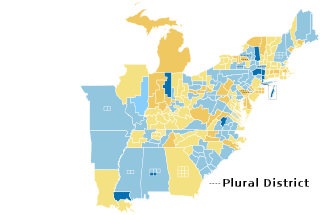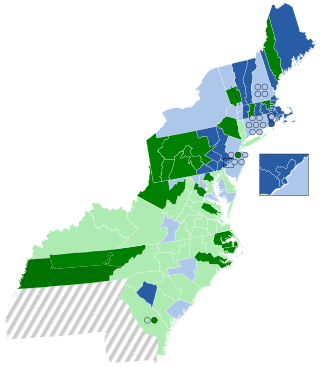| Elections in Massachusetts |
|---|
 |
Following the 1790 census, Massachusetts's representation increased from eight to fourteen Representatives and was redistricted into four plural districts, plus a single at-large district. The 4th district covered the District of Maine (the modern-day State of Maine). The plural districts were concurrent tickets rather than a single general ticket, though the 1st and Massachusetts 2 s appear to have also had a general ticket alongside the more specific tickets.
As before, a majority was required for election, in those districts where a majority was not achieved, additional ballots were required.
| District | Incumbent | This race | |||
|---|---|---|---|---|---|
| Member | Party | First elected | Results | Candidates | |
| Massachusetts 1 (4 seats) Seat A: At-large | None (District created) | New seat. New member elected. Anti-Administration gain. | First ballot(November 2, 1792): Jonathan Jones 39.8% William Heath 31.0% James Bowdoin 23.2% Theophilus Parsons 6.0% Second ballot(January 14, 1793): Jonathan Jones 29.3% Samuel Holten (Anti-Admin) 25.6% James Bowdoin 17.1% Samuel Sewall (Pro-Admin) 13.1% William Heath 8.3% Joseph Bradley Varnum (Anti-Admin) 3.8% Elbridge Gerry (Anti-Admin) 2.8% Third ballot(April 1, 1793): √ Samuel Holten (Anti-Admin) 69.9% Benjamin Austin 30.1% | ||
| Massachusetts 1 (4 seats) Seat B: Essex County | Benjamin Goodhue Redistricted from the 2nd district | Pro-Administration | 1789 | Incumbent re-elected. | √ Benjamin Goodhue (Pro-Admin) 100% |
| Massachusetts 1 (4 seats) Seat C: Middlesex County | Elbridge Gerry Redistricted from the 3rd district | Anti-Administration | 1789 | Incumbent lost re-election. New member elected. Pro-Administration gain. | √ Samuel Dexter (Pro-Admin) 61.4% Joseph Bradley Varnum (Anti-Admin) 26.2% Elbridge Gerry (Anti-Admin) 12.4% |
| Massachusetts 1 (4 seats) Seat D: Suffolk County | Fisher Ames | Pro-Administration | 1788 | Incumbent re-elected. | √ Fisher Ames (Pro-Admin) 62.4% Benjamin Austin 37.6% |
| Massachusetts 2 (4 seats) Seat A: At-large | None (District created) | New seat. New member elected. Pro-Administration gain. | First ballot(November 2, 1792): Samuel Lyman (Pro-Admin) 41.3% Theodore Sedgwick (Pro-Admin) 37.9% William Lyman (Anti-Admin) 6.7% Samuel Moorhaus 6.2% Simson Strong 4.% Dwight Foster (Pro-Admin) 3.5% Second ballot(January 14, 1793): Samuel Lyman (Pro-Admin) 35.4% Dwight Foster (Pro-Admin) 25.1% Thomson J. Skinner (Anti-Admin) 19.6% William Lyman (Anti-Admin) 12.1% Jonathan Grout (Anti-Admin) 4.0% William Shepard (Pro-Admin) 3.8% Third ballot(April 1, 1793): √ Dwight Foster (Pro-Admin) 55.3% Samuel Lyman (Pro-Admin) 44.7% | ||
| Massachusetts 2 (4 seats) Seat B: Berkshire County | Theodore Sedgwick Redistricted from the 4th district | Pro-Administration | 1789 | Incumbent re-elected. | √ Theodore Sedgwick (Pro-Admin) 63.8% Thomson J. Skinner (Anti-Admin) 29.1% John Bacon (Anti-Admin) 7.1% |
| Massachusetts 2 (4 seats) Seat C: Hampshire County | None (District created) | New seat. New member elected. Anti-Administration gain. | First ballot(November 2, 1792): Samuel Lyman (Pro-Admin) 37.4% William Lyman (Anti-Admin) 32.3% Thomas Dwight (Pro-Admin) 16.8% Samuel Hinshaur 6.7% John Williams 3.6% Dwight Foster (Pro-Admin) 3.1% Second ballot(January 14, 1793): William Lyman (Anti-Admin) 38.0% Samuel Lyman (Pro-Admin) 31.3% William Shepard (Pro-Admin) 18.0% Thomas Dwight (Pro-Admin) 12.7% Third ballot(April 1, 1793): √ William Lyman (Anti-Admin) 53.1% Samuel Lyman (Pro-Admin) 46.9% | ||
| Massachusetts 2 (4 seats) Seat D: Worcester County | Artemas Ward Redistricted from the 7th district | Pro-Administration | 1790 | Incumbent re-elected. | √ Artemas Ward (Pro-Admin) 59.5% Jonathan Grout (Anti-Admin) 36.8% Dwight Foster (Pro-Admin) 3.8% |
| Massachusetts 3 (2 seats) Seat A: Barnstable, Dukes, & Nantucket Counties | George Leonard Redistricted from the 6th district | Pro-Administration | 1788 | Incumbent lost re-election. New member elected. Pro-Administration hold. | √ Peleg Coffin, Jr. (Pro-Admin) 52.6% George Leonard (Pro-Admin) 34.3% Phanuel Bishop (Anti-Admin) 13.1% |
| Massachusetts 3 (2 seats) Seat B: Bristol & Plymouth Counties | Shearjashub Bourne Redistricted from the 5th district | Pro-Administration | 1790 | Incumbent re-elected. | First ballot(November 2, 1792): John Davis 49.2% Shearjashub Bourne (Pro-Admin) 26.1% James Warren 24.8% Second ballot(January 14, 1793): √ Shearjashub Bourne (Pro-Admin) 53.0% John Davis 40.6% James Warren 6.4% |
| Massachusetts 4 (3 seats) District of Maine Seat A: Cumberland County | None (District created) | New seat. New member elected. Pro-Administration gain. | First ballot(November 2, 1792): Daniel Davis 40.0% Peleg Wadsworth (Pro-Admin) 38.6% Robert Southgate 11.7% Josiah Thacker 9.8% Second ballot(January 14, 1793): Peleg Wadsworth (Pro-Admin) 48.4% Daniel Davis 42.2% Robert Southgate 9.4% Third ballot(April 1, 1793): √ Peleg Wadsworth (Pro-Admin) 58.0% Daniel Davis 42.0% | ||
| Massachusetts 4 (3 seats) District of Maine Seat B: Lincoln, Hancock, & Washington Counties | None (District created) | New seat. New member elected. Anti-Administration gain. | First ballot(November 2, 1792): William Lithgow 49.98% Henry Dearborn (Anti-Admin) 32.2% Daniel Coney 11.8% Alan Campbell 6.0% Second ballot(January 14, 1793): √ Henry Dearborn (Anti-Admin) 60.9% William Lithgow 39.1% | ||
| Massachusetts 4 (3 seats) District of Maine Seat C: York County | George Thatcher Redistricted from the 8th district | Pro-Administration | 1788 | Incumbent re-elected. | √ George Thatcher (Pro-Admin) 57.7% Nathaniel Wells 35.4% Tristan Jordan 6.9% |
| Massachusetts at-large | None (District created) | New seat. New member elected. Pro-Administration gain. | √ David Cobb (Pro-Admin) 52.6% Charles Jarvis 9.6% William Heath 6.9% Theodore Sedgwick (Pro-Admin) 4.9% Elbridge Gerry (Anti-Admin) 2.1% Jonathan Jones 1.9% Fisher Ames (Pro-Admin) 1.7% James Sullivan (Anti-Admin) 1.5% Samuel Horton 1.3% Scattering 17.4% | ||












